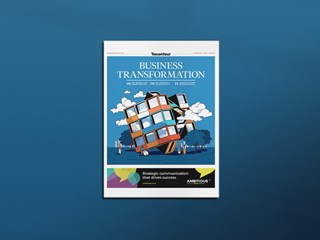25. September 2020
Since the advent of the Internet more than 30 years ago, the world has changed in ways that few could have predicted. The pace of that change too has accelerated, with the rate of technological transformation picking up speed every year. Technology has advanced more in the last century than it has in the rest of history.
E-commerce illustrates well the changes that have been taking place. In a matter of years, shopping online went from mere novelty to becoming a part of everyday life for many. E-commerce is now a multi-billion-dollar industry, with players like Amazon and Alibaba achieving some of the highest capitalizations in the world. Nowadays, there is nothing you cannot buy on the Internet—from groceries to insurance policies, every commodity you can imagine is for sale online.
The exponential growth the world of e-commerce and retail has seen has been enabled by the application of several key technologies. Data scientists, researchers and professionals from myriad fields have applied these technologies to optimise supply chains, reduce shipping costs and save companies millions of dollars.
Artificial Intelligence
At the forefront of the current technological revolution is a set of key technologies, spearheaded by Artificial Intelligence, also known as AI. AI is a field in computing that studies how the human brain operates, seeking to apply those biological processes to computers. Unlike traditional computing where a coder provides an input, output and logic, in AI the machine only requires the input; it is then left to its own devices to figure out the rest of the equation.
AI is not some future technology concocted in science-fiction movies. It is very real, and it’s already here. Some of the most common techniques associated with AI include machine learning, neural networks and deep learning, to name but a few. You probably use tech based on these techniques every day, even if you don’t know it. Netflix, Facebook, and Amazon all rely on AI to deliver their services and improve the experience of their customers.
The disruption AI is causing in traditional industries is not only obvious—it’s profound. From changing the way products are manufactured to how they are shipped, marketed, and used by the consumer, AI’s impact upon the world cannot be overstated.
AI-based algorithms capable of accurately predicting consumer behaviour are constantly changing the face of e-commerce and retail. Amazon, the world’s biggest e-commerce platform and one of the most valuable companies in the world, has been perfecting its own algorithm for quite some time. It is now pretty darn good at knowing what you want to buy even before you do.
Chatbots
Conversational AI, also known as chatbots, is another technology that has taken off in the past few years. These chatbots have become so sophisticated that, in many cases, users cannot tell them apart from their human counterparts. They make it possible to quickly and efficiently answer customers’ main queries and problems.
H&M, the Swedish clothing giant, uses these bots to help visitors to their website find exactly what they’re looking for. H&M’s chatbots make suggestions to the customer on what they might want to try on based on their preferences.
Sephora, a French cosmetics manufacturer, lets its users try their lipstick and eyeshadows on a photo of themselves that they share with the bot. The bot’s AI technology identifies the user’s facial features and uses augmented reality to apply these makeup tests.
 As they replaced humans, these chatbots have saved companies millions of dollars in salaries and have improved the customer experience immensely. The most advanced chatbots can already answer open-ended questions in a human-like way.
As they replaced humans, these chatbots have saved companies millions of dollars in salaries and have improved the customer experience immensely. The most advanced chatbots can already answer open-ended questions in a human-like way.
Machine Learning
As the retail market becomes ever more crowded, companies are using AI-enabled personalization to differentiate themselves to the consumer. To this end, many rely on machine learning, an AI technique that seeks to develop systems that learn and grow based on experience—computers automatically improve and adapt their processes without any targeted programming.
E-commerce retailers need to collect huge amounts of data and make sense of it to provide an experience similar to what a customer would have in the store. Machine learning helps e-commerce firms run targeted campaigns to attract buyers.
Online businesses also use machine learning to implement dynamic pricing. Using machine learning, businesses can change and readjust prices by taking into account various factors all at once. These factors include competitor pricing, product demand and day of the week.
According to a report by Boston Consulting Group, retailers who use machine learning for personalization have seen sales increases of up to 10 percent compared to companies that do not employ these techniques.
A prominent example of a company utilizing AI to improve customer experience is Cogito. Founded by CEO Joshua Feast and Dr Sandy Pentland, Cogito fuses machine learning and behavioural science to facilitate the job of phone professionals and make voice calls more
enjoyable for customers.
Other AI applications include personalizing online interfaces, tailoring product recommendations and increasing search relevance. As AI continues to evolve and its benefits become more evident, more and more companies are investing money in making machines think like humans.











